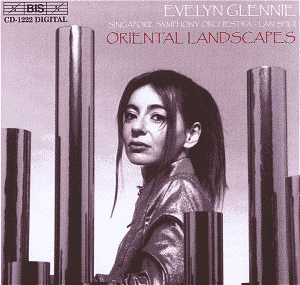It has often been said that Western composers came
into contact with percussion and percussion music at the time of the
Paris World Fair at the very end of the 19th Century. From
this time, so called exotic instruments made their way into Western
music thanks to composers such as Stravinsky, Milhaud (who may well
have composed the first percussion concerto of all times), Bartók,
Varèse, Jolivet and Messiaen, to name but a few. Since then there
have been many works for percussion, often drawing their musical inspiration
from the East and the Far East. This is the common feature shared by
the four pieces recorded here.
Hovhaness’s interest in Eastern cultures is well-known
and many of his numerous works, both small and large, have been inspired
by Japan or Bali. His xylophone concerto Fantasy on Japanese Wood
Prints Op.211 composed in 1965 is one such work. Its title rather
suggests a suite of short colourful sketches capped by a lively dance
section. Most Hovhaness hallmarks are there, most prominently, modally
inflected themes. This colourful work has already been recorded (at
least) once before (played by Robert van Sice who nevertheless chose
to perform it on marimba rather than on xylophone [Etcetera KTC 1085]).
Thea Musgrave has composed a number of superb and highly
inventive concertos, most of which have been recorded at one time or
another. However, her Journey through a Japanese Landscape
for marimba and wind ensemble, completed in 1994 and first performed
in Cheltenham that year by Evelyn Glennie and the RNCM Wind Ensemble
conducted by Timothy Reynish, is new to the catalogue. It is based on
a series of Japanese haikai representing the seasons of the year.
(A pity, though, that these short poems are not printed in the otherwise
excellent notes.) As might be expected, this is another fine example
of Musgrave’s imaginative and colourful writing. This piece is a worthy
successor to her earlier concertos and a most welcome addition to her
discography.
Chen Yi and Zhou Long, husband and wife incidentally,
are both Chinese-born composers in their late forties. Both, too, are
highly representative of Chinese composers whose early composing efforts
were cut short by the so-called Cultural Revolution that – ironically
enough – aimed first and foremost at suppressing rather than highlighting
the pre-Communist Chinese cultural past. Thus, when allowed to resume
their musical studies, they – and other Chinese composers – turned to
their country’s musical and cultural past, as it were, as a reaction
and an exorcism as well. Their music includes a number of features of
early Chinese music in an attempt at reconciling Eastern thinking with
Western musical techniques. This is quite evident in Chen’s substantial
Percussion Concerto of 1998 written for and first performed
by Evelyn Glennie with the Singapore Symphony Orchestra conducted by
Lan Shui. The first movement draws on a tune from the traditional Beijing
opera Farewell to my Concubine whereas the second movement is
a realisation of a poem Prelude to Water Tune in which the percussion
player also declaims the words imitating "the exaggerated reciting
style of Beijing opera". The last movement Speedy Wind is
a lively, rhythmically alert piece of music including a cadenza for
percussion leading into the work’s fiery conclusion. As a whole, the
piece is quite impressive and quite attractive, though it may be a bit
too long. It is nevertheless quite rewarding.
The cultural world of the Tang dynasty (618 – 907)
apparently means much to Zhou and has had a lasting influence on his
music. His subtly scored Two Poems from Tang was selected
for the 1997 Masterprize and was recorded that year by the London Symphony
Orchestra conducted by Daniel Harding. His Out of Tang Court
recorded here is scored for a Tang ensemble (i.e. gu-zheng [a
21-string Chinese zither], pi-pa [a 4-string lute] and er-hu
[a 2-string vertical fiddle]) and orchestra. Its is a subtly and delicately
piece of music of great beauty. No doubt, the real gem in this most
interesting release.
Performances here could not be bettered and are superbly
recorded. A rather unusual release, maybe, but a most enjoyable and
interesting one opening many new musical vistas. Not for Glennie’s fans
only.
Hubert Culot
